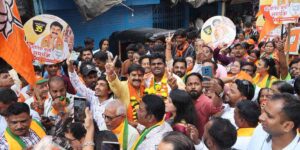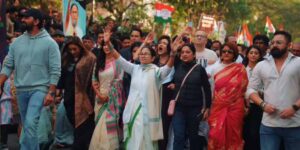The electoral victory of former cricketer Yusuf Pathan from Baharampur rekindled the long-standing debate over whether celebrity status alone could shape an effective politician. Pathan, a political novice, was fielded by the Trinamool Congress (TMC)—reportedly at Abhishek Banerjee’s behest—and went on to defeat Congress heavyweight Adhir Ranjan Chowdhury. However, his silence during unrest in Murshidabad led to criticism of his political detachment. A social media post of him sipping tea amid tensions drew backlash, highlighting concerns about celebrity MPs’ lack of engagement. This reflected a broader trend of celebrities being fielded for name recognition or to balance party equations, often without expectations of long-term political commitment. While some like Kirti Azad transitioned successfully, others faded from active roles. TMC’s Satabdi Roy, Dev, June Maliah, Sayoni Ghosh, and BJP’s Locket Chatterjee, Agnimitra Paul showed sustained dedication. Conversely, Moon Moon Sen and Sandhya Roy won seats but failed to leave a mark. BJP stars Hema Malini and Sunny Deol also faced absenteeism charges. Among Pathan’s cricketing peers, Lakshmi Ratan Shukla exited politics; Manoj Tiwary, despite a ministerial post, remained largely inactive. BJP’s Ashok Dinda, however, stayed visible. Though TMC defended Yusuf, arguing that the unrest occurred in a Congress MP’s area, even party insiders admitted only a few celebrities remained actively engaged. BJP’s Dilip Ghosh remarked that most celebrities joined politics for perks, not service. CPM’s Mohammed Salim emphasized that real leadership demanded grassroots work and personal sacrifice—values rarely found overnight.

 Politics
Politics Business
Business Entertainment
Entertainment Sports
Sports Celebrities
Celebrities





